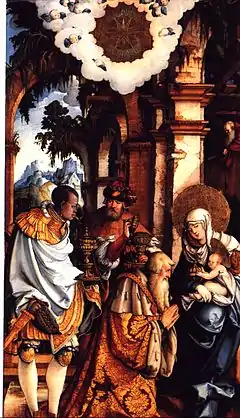Portal:Catholic Church/Patron Archive/January 6
The biblical Magi (/ˈmeɪdʒaɪ/ or /ˈmædʒaɪ/; singular: magus)—also known as the Three Wise Men, Three Kings, and the Three Magi—were distinguished foreigners in the Gospel of Matthew and Christian tradition. They are said to have visited Jesus after his birth, bearing gifts of gold, frankincense, and myrrh. They are regular figures in traditional accounts of the nativity celebrations of Christmas and are an important part of Christian tradition.

The Gospel of Matthew is the only one of the four canonical gospels to mention the Magi. Matthew 2:1–2 has it that they came "from the east" to worship the "king of the Jews". The gospel never mentions the number of Magi. Still, most western Christian denominations have traditionally assumed them to have been three in number, based on the statement that they brought three gifts. In Eastern Christianity, especially the Syriac churches, the Magi often number twelve. Their identification as kings in later Christian writings is probably linked to Isaiah 60:1–6, which refers to "kings [coming] to the brightness of your dawn" bearing "gold and frankincense". Further identification of the magi with kings may be due to Psalm 72:11, "May all kings fall down before him". (Full article...)
Attributes: With rich oriental clothes, with presents in front of the crib, one of them with dark skin color
Patronage: Town of Cologne, travelers, pilgrims, furriers, producers of playing cards, against storm and epilepsy
See also: Rafaela Porras Ayllón; Juan de Ribera, Spain; Charles of Sezze; André Bessette, Canada